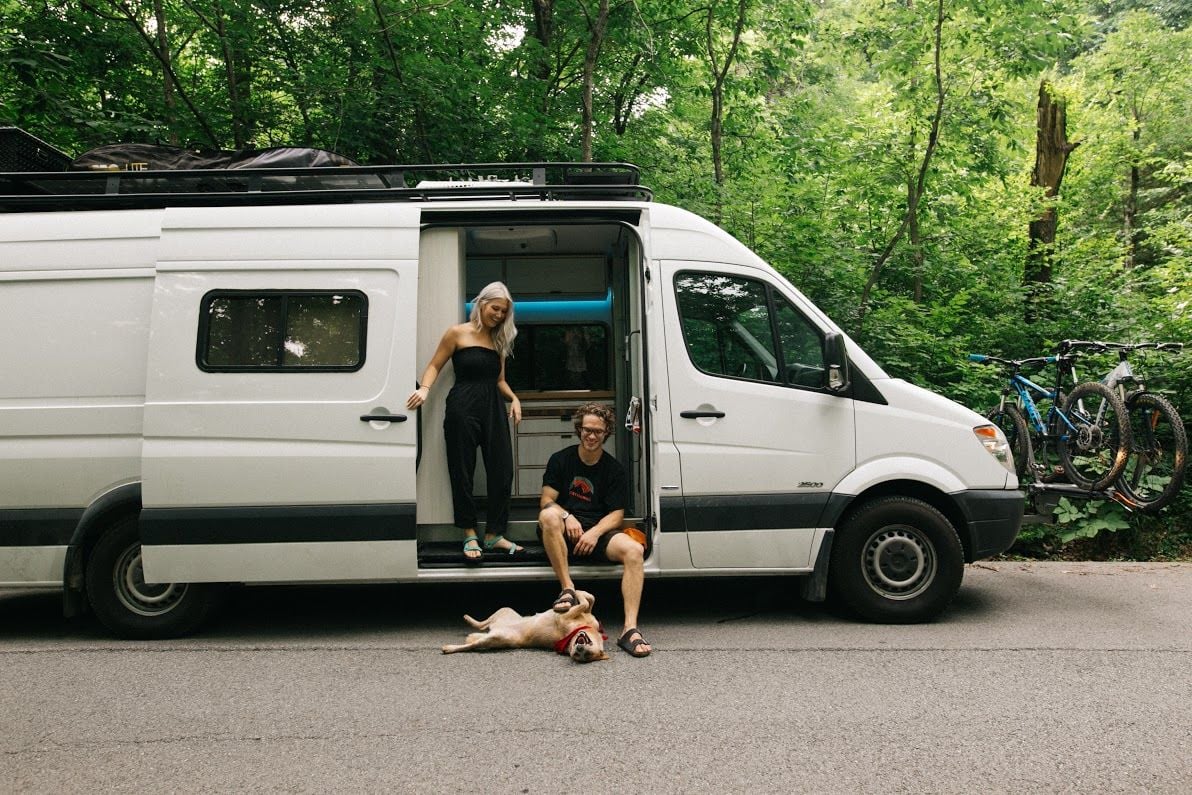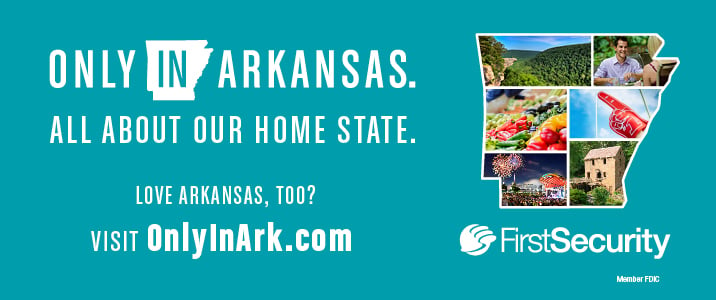
Alex Cogbill (modus), Kevin Brown (modus), Jason Wright (modus), Mo Elliott (FC), Gracie Edwards (FC), Cory Meyer (modus) and Paul Siebenthal (modus) stand in front of the Sprinter Van project they collaborated on.
Photo: Heno Head
Local fabricators Jason Wright and Corey Meyer of Fayetteville’s modus shop, consider themselves to be problem solvers.
Architects by trade, and self-proclaimed “jacks of all trades and masters of none,” they spend most of their days taking on projects that, at least initially, they have no idea how, or if, they’ll be able to complete.
So when local entrepreneur Mo Elliot of Fayettechill approached them about converting a stripped-down Sprinter van into a partially solar-powered house-on-wheels for an upcoming year-long road trip adventure he and his girlfriend Gracie Edwards were planning, well, he knew exactly who to call.
“I’d worked with them on our Basecamp location, and we’d kept in touch on ideas since then,” Elliot said. “In February, I decided to hit them up about the van project.”
As co-founder of Fayettechill, Elliot had plans to visit manufacturers, retailers, designers, and athletes on the West Coast this fall in order to help grow his business. On the first leg of his adventure, he’ll be hitting up Sante Fe, Durango, Telluride, San Diego, Portland, Salt Lake, and Alaska.
He needed a cost-effective way to travel for extended periods since he’ll be spending time in both urban and extremely remote environments. He needed a place to sleep, cook, a toilet, some storage for his products, and a refrigerator. And he’d like for it to be solar powered, if possible.
He met with Wright and Meyer of modus shop, who he knew have a proclivity for biting off more than they can chew, and most of the time, finding a way to chew it anyway. Naturally, they were up for the challenge.
“We basically said, ‘cool idea,'” Wright said. “‘We don’t know what we’re doing, or how much it’s going to cost yet, but if you’re ready to go down that road, we are, too.'”
A vehicle for life on the road

Customized roof rack organizes storage space, PV panels, solar hot water, and propane tanks.
Photo: Heno Head
The project started with the Mercedes Sprinter van that Elliot had recently purchased, and stripped down on the interior.
The challenge was to fit all of the amenities needed for a year on the road into the roughly 80 square feet of space inside the van.
Wright and Meyer went directly to work on the design based on the input and ideas of Elliot and Edwards. Even after they’d settled on the direction, the project was not without its challenges.
“It seems like we discovered a new problem every day,” Wright said. “Luckily, nothing ever seemed to be so problematic that we couldn’t come up with a fix.”
When they couldn’t, Wright said, they were able to lean on someone locally who could help. Flint Richter of Richter Solar Energy and Michael Sloan of Stronghold were instrumental in taking care of the challenges with solar power and the cabinetry, for example.
“This region is chock full of really smart people,” Wright said. “Luckily, were able to rely on our connections in the building industry and relationships we’d made through the university (of Arkansas). Over the years we’ve developed a network of talented individuals.”
The finished product ended up marking every box on Elliot’s checklist.
The van is complete with a full-size bed which transforms into a table for four, a mini fridge, gas range, sink, shower, toilet, and believe it not, storage. It runs on solar power, gas and propane.
Of all the features, however, the shower might be his favorite.
“I love the kitchen window. The fridge is great, and the solar setup is amazing,” Elliot said. “But when you’re on the side of a cliff in the middle of nowhere, that shower is a game changer.”
modus shop
Modus shop began as a way for local architecture firm modus studio to prototype their design ideas for their clients.
They still do plenty of that type of work for their parent company, but the shop has recently begun working more independently on their own projects.
In addition to custom client projects, they also design and produce their own products.
The first of those is the Bike Clip, a custom, minimalist wall-mounted bicycle rack created through an internal design competition that the company sells through their Etsy shop.
They’re currently working on a second product, something they’re calling a “fire box,” which is a small, mobile outdoor grill and fire pit.
They also recently developed a steel forge contraption that they use to perform something called “shou sugi ban,” an ancient Japanese charring technique designed to burn all six sides of a cypress board evenly. The resulting wood is resistant to fire, rot, and pests, and adds a distinctive design element when applied to a building’s exterior.
As time goes on, the shop continues to diversify their skill set as they solve individual challenges for their clients, adding to their bag of tricks seemingly with every project. The shop employs artisans with a variety of skills to help widen that knowledge base as well.
“I think what’s cool about our shop is we’ve got a trained blacksmith, artists, graphic designers, an ex marine,” Meyer said. “And we have guys who just float, and go back and forth to make sure everything runs smoothly.”
The skills and abilities of the workers are definitely a selling point for the shop, but their clients seem to appreciate them for another reason.
“I don’t hear a lot of “no” working with modus,” Elliot said. “That’s what I really like about those guys.”
More photos












